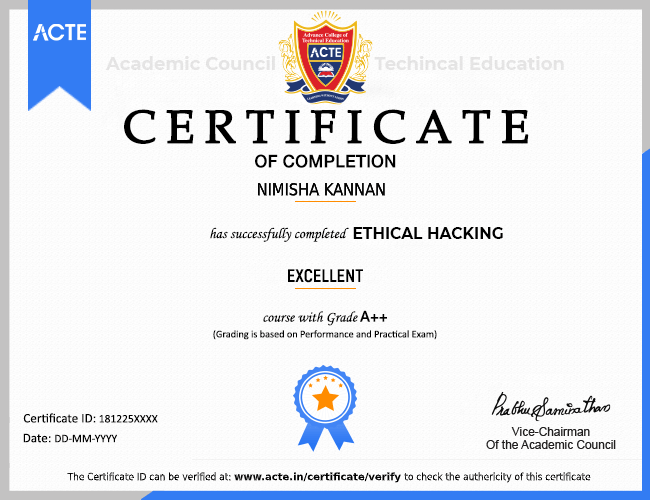Learn (Ethical Hacking + Footprinting & Reconnaissance + Network Scanning & Enumeration + Web Hacking + Malware & IoT Hacking) at ₹21,240 - Only. Grab now
Ethical Hacking Course With 100% Job Guarantee
- Ethical Hacking Courses Are Reasonably Priced.
- Access to the Student Portal, Materials, Videos, and More.
- Over 12904+ Students Trained and 360+ Recruiting Clients.
- Ethical Hacking Training Classes for Beginners and Experts.
- Expert in Ethical Hacking With Over 9+ Years of Experience.
) 3K+
3K+
-
Course 1 Introduction to Ethical Hacking
-
Course 2 Footprinting and Reconnaissance
-
Course 3 Network Scanning and Enumeration
-
Course 4 System and Web Hacking
-
Course 5 Malware and IoT Hacking
-
Hands-on Project (Penetration Testing, Network Scanning, Vulnerability Assessment)
-
Job Preparation (Aptitude, Resume Preparation, Mock Interview)
Our Top Placement Companies











Key Highlights


Placement Assistance

Exclusive access to ACTE Job portal

Mock Interview Preparation

1 on 1 Career Mentoring Sessions

Career Oriented Sessions

Resume & LinkedIn Profile Building
Curriculum Designed By Experts
Navigating Success: Custom Curriculum for Future-Ready Achievement
Industry Oriented Curriculum
An exhaustive curriculum designed by our industry experts which will help you to get placed in your dream IT company
-
30+ Case Studies & Projects
-
9+ Engaging Projects
-
10+ Years Of Experience
Ethical Hacking Training Projects
Become a Ethical Hacking Expert With Practical and Engaging Projects.
-
Practice essential Tools
-
Designed by Industry experts
-
Get Real-world Experience
Wireless Network Auditing
Perform a security audit on your personal Wi-Fi network. Utilize tools such as Aircrack-ng or Reaver to evaluate the security of your Wi-Fi connection.
Basic Malware Analysis
Examine a basic malware specimen by employing online sandboxes. Monitor its actions and extract insights regarding its operational characteristics.
Password Hygiene Audit
Assess the strength of your own or a peer's password practices and offer suggestions for enhancing password security.
Wireless Network Pentesting
Perform a security assessment of a Wi-Fi network with WPA/WPA2 encryption. Attempt to crack the Wi-Fi password using brute force or dictionary attacks.
Digital Forensics
Analyze a compromised system or digital device to determine the extent of an intrusion. Recover deleted files and trace the attacker's activities.
Secure Code Review
Review the source code of a web application for security vulnerabilities. Provide recommendations and code fixes.
Red Team Engagement
Simulate a full-scale red team engagement for an organization, including penetration testing, social engineering, and post-exploitation activities.
Cloud Security Assessment
Assess the security of cloud-based infrastructure (e.g., AWS, Azure, Google Cloud). Identify misconfigurations and vulnerabilities.
Incident Response Simulation
Simulate a cyber incident and practice the complete incident response process, from detection and containment to recovery and lessons learned.
25+ Skill to Master
Footprinting and Reconnaissance
Scanning Networks
DNS Cache Snooping
System Hacking
Sniffing
Malware Threats
Vulnerability Analysis
Deep Learning
Denial-of-service
Session Hijacking
Evading IDS
Firewalls and Honeypots
Hacking Web Servers
Hacking Wireless Networks
Hacking Mobile Platforms
IoT Hacking
Cryptography
12+ Tools to Master







Ethical Hacking Certification

Ethical hacking certifications can open doors to rewarding career opportunities in cybersecurity. They demonstrate your competence and commitment to ethical hacking best practices, making you more attractive to employers.
Some of the most recognized ethical hacking certifications include:
Prerequisites vary depending on the certification. Generally, you should have a basic understanding of cybersecurity and networking concepts. Some certifications may require specific training or work experience.
Preparation typically involves studying relevant course material, taking training programs, and practicing hands-on exercises. Many certification providers offer official study guides, practice exams, and training courses.
You can take most certification exams at authorized testing centers, which may be physical locations or online proctored exams. Check with the certification provider for specific details.
Certification validity varies by provider. Some certifications are valid for a lifetime, while others require renewal every few years through continuing education or re-examination.
Ethical hackers are hired to identify and address security vulnerabilities in computer systems, networks, and applications. They perform penetration testing, vulnerability assessments, and security audits to help organizations protect their digital assets.
Yes, ethical hacking is legal when performed with proper authorization and consent. Ethical hackers must adhere to legal and ethical guidelines and obtain permission from the system or network owner before conducting any security testing.
Job Assistant Program
Your Intent To Master Next Level Skills Are Appreciated
We Take Pride In Being Part Of 4 Lakh Plus Career Transition Worldwide
Our Requirement Strong
-
Course Completion
Get hands-on training from experts.
-
Resume Building
Experts help you in building the best of your portfolio.
-
Group Discussion
Know where you stand in the skill mastery
-
Mock Interviews
Experience real-time interviews with SMEs
-
Placements
Facilitating career success through strategic industry placements












100+ Organizations Trust Us With Their Openings
ACTE stands as the favored option for more than 100+ well-established companies on the lookout for top-tier talent to fill their job openings. This unwavering trust we've earned is a testament to our extensive experience and a proven track record. In this article, we will explore the foundations of this trust and how our steadfast dedication to excellence continually produces exceptional results.
1000+ Hiring companies
3K+ Student already placed
Career Transition
-
55% Average Salary Hike
-
45 LPA Highest Salary
-
12000+ Career Transition
-
400+ Hiring Partners

Chintu Gowda Fresher
Security Analyst | Bengaluru
Got 3 LPA Package
ACTE Training made the leap from fresher to Security Analyst attainable with hands-on labs and practical scenarios. Instructor support and job placement assistance kickstarted my cybersecurity career. Highly recommended for security enthusiasts.

Nilan Fresher
Security Engineer | Chennai
Got 3 LPA Package
ACTE Training enabled my transition from fresher to Security Engineer with a comprehensive cybersecurity program, including ethical hacking and incident response. Instructors acted as mentors, simplifying complex concepts. Their support led to my role as a Security Engineer, shaping my career positively.

Preethi Fresher
Security Architect | Hyderabad
Got 3 LPA Package
ACTE Training turned my fresher start into a Security Architect reality with in-depth cybersecurity training and industry exposure. Instructors acted as mentors, and job placement support secured my role. A fantastic launchpad for my security career.
Job Opportunities in Ethical Hacking
More Than 35% Of Developers Prefer Ethical Hacking. Ethical Hacking Is The Most Popular And In-Demand Programming Language In The Tech World.
You can Work as a
Upcoming In-Demand Jobs
Salary In Ethical Hacking
- Penetration Tester ₹2.8LPA - ₹3.5 LPA
- Security Analyst ₹3 LPA - ₹4 LPA
- Security Consultant ₹3.5 LPA - ₹4.8 LPA
- Incident Responder ₹4 LPA - ₹6 LPA
- Vulnerability Assessor ₹5 LPA - ₹7 LPA
- Security Engineer ₹6 LPA - ₹8 LPA
- Cybersecurity Researcher ₹8 LPA - ₹10 LPA
Ethical Hacking Training FAQ's
Master Ethical Hacking: From Fundamentals to Expertise - Ignite Your Coding Journey!
Ethical Hacking training is legal and ethical when conducted for the purpose of identifying and addressing security vulnerabilities with proper authorization. Ethical hackers, also known as white-hat hackers, work within legal and ethical boundaries.
Ethical Hacking training benefits a range of professionals, including:
It is suitable for anyone interested in cybersecurity and those pursuing careers in ethical hacking or related fields.
Prerequisites for Ethical Hacking training may vary depending on the course. Some programs are suitable for beginners and do not require specific prerequisites, while advanced courses may assume prior knowledge of networking, security fundamentals, or programming.
Ethical Hacking training courses encompass various critical topics:
These courses provide a well-rounded education in cybersecurity and ethical hacking.
The duration of Ethical Hacking training can vary depending on the course and the learner’s pace. Some courses can be completed in a few weeks, while more comprehensive programs may span several months.
Self-paced Ethical Hacking training allows individuals to learn at their own pace and convenience. Training materials, including video lectures, labs, and practice exams, are provided online, enabling learners to access and complete the course content when and where they choose.
Advantages of self-paced Ethical Hacking training include:
Self-paced training caters to individual preferences and learning styles.
Prerequisites for self-paced Ethical Hacking training may vary depending on the course. Some programs are suitable for beginners and do not require specific prerequisites, while more advanced courses may assume prior knowledge of networking and cybersecurity fundamentals.
Self-paced Ethical Hacking training courses encompass a diverse set of topics:
These courses provide comprehensive knowledge for self-guided learners.
Yes, online Ethical Hacking training is suitable for individuals at various skill levels, including beginners. Some courses are designed to provide a foundational understanding of Ethical Hacking concepts.
Advantages of online Ethical Hacking training include:
These benefits make online training a convenient and efficient choice for learners.
Prerequisites for online Ethical Hacking training can vary depending on the course. Some programs are designed for beginners and do not require specific prerequisites, while more advanced courses may assume prior knowledge of networking and cybersecurity basics.
Online Ethical Hacking training courses encompass a broad spectrum of topics:
These courses provide a comprehensive understanding of cybersecurity and ethical hacking principles.
The duration of online Ethical Hacking courses can vary widely depending on the course’s complexity and the learner’s pace. Some courses can be completed in a few weeks, while more comprehensive programs may take several months.
Corporate Ethical Hacking training is a specialized form of education designed to equip employees with the skills and knowledge needed to identify and address security vulnerabilities in an organization’s systems and networks. It is crucial for organizations to proactively assess their security posture and protect against cyber threats.
Corporate Ethical Hacking training benefits various professionals in an organization:
It caters to a diverse range of roles involved in maintaining and enhancing an organization’s security posture.
Yes, many corporate Ethical Hacking training providers offer remote or virtual training options, which are especially valuable for organizations with remote or distributed teams.
Topics covered in corporate Ethical Hacking training programs include:
Depending on the program, employees may receive certificates of completion or achievement for the Corporate Ethical Hacking Training they undergo.
Benefits of Learning at ACTE
Embrace the benefits of education here, and watch your future flourish!!
- Flexibility: Online, weekends & more.
- Hands-on: Projects & practical exercises.
- Placement support: Resume & interview help.
- Lifelong learning: Valuable & adaptable skills.
- Full curriculum: Foundational & advanced concepts.
Get Training Quote for Free
Learn (Ethical Hacking + Footprinting & Reconnaissance + Network Scanning & Enumeration + Web Hacking + Malware & IoT Hacking) at ₹21,240 - Only. Grab now
Connect With Course Advisor
Talk to a Career Expert
Take free counselling
Transform Your Ambitions into Achievements.

- Get Placed in 60days
- 100% Placement Support Is Provided to Students.
- Trainers Have 9+ Years of Experience.
- Global Recognization Certification Provided.
100% Placements | Get Hired in Top MNC
Free Addon Benefit You’ll Gain
- 550+ Students Placed Every Month
- Free Aptitude and Technical Skills Training
- Hands-On Projects
- AI Powered Self Interview Practice Portal
- Interview Preparation For Freshers
- LMS Online Learning Platform
- 100% Placement Assistance
Freshers To IT
NON-IT To IT
Career Gap
Less Then 60%
100% Placements | Get Hired in Top MNC
Want to be our Franchise?
Error: Contact form not found.
Corporate Training Enquiry
Internship Training with Certification
Apply to Job
Get Training Quote for Free
Connect With Course Advisor
Talk to a Career Expert
Schedule 1:1 free counselling
Transform Your Ambitions into Achievements.
- We Offer Practical Classes.
- 100% Placement Support Is Provided to Students.
- Trainers Have 9+ Years of Experience.
- Global Recognization Certification Provided.
100% Placements | Get Hired in Top MNC
Testimonials
100% Placements | Get Hired in Top MNC
Connect with Our Advisor
Note :
Process Will be Halted by today 4.30pm. So share the resumes before 4.30pm.
For More Details Contact Your ACTE Branch






